Tesla Motors: Board Dynamics and Strategic Decisions
VerifiedAdded on 2023/02/01
|14
|3782
|56
Case Study
AI Summary
This case study examines Tesla Motors, focusing on the company's founding, leadership under Elon Musk, and strategic decisions. It delves into the controversial acquisition of SolarCity and the ethical concerns surrounding the close relationships between board members and Musk. The analysis explores the legality and ethics of the board's actions, including the directors' duties of loyalty and care. The study investigates the structure of Tesla's board of directors, its independence, and the incentives of board members. It also discusses the concept of fiduciary duty, including obedience, loyalty, and care, and its application in the context of Tesla's corporate governance. The assignment requires an understanding of the actions taken by Musk, the board's structure, and the implications of these decisions on shareholders and the company's overall performance.

1
Name:
Course
Professor’s name
University name
City, State
Date of submission
Name:
Course
Professor’s name
University name
City, State
Date of submission
Paraphrase This Document
Need a fresh take? Get an instant paraphrase of this document with our AI Paraphraser
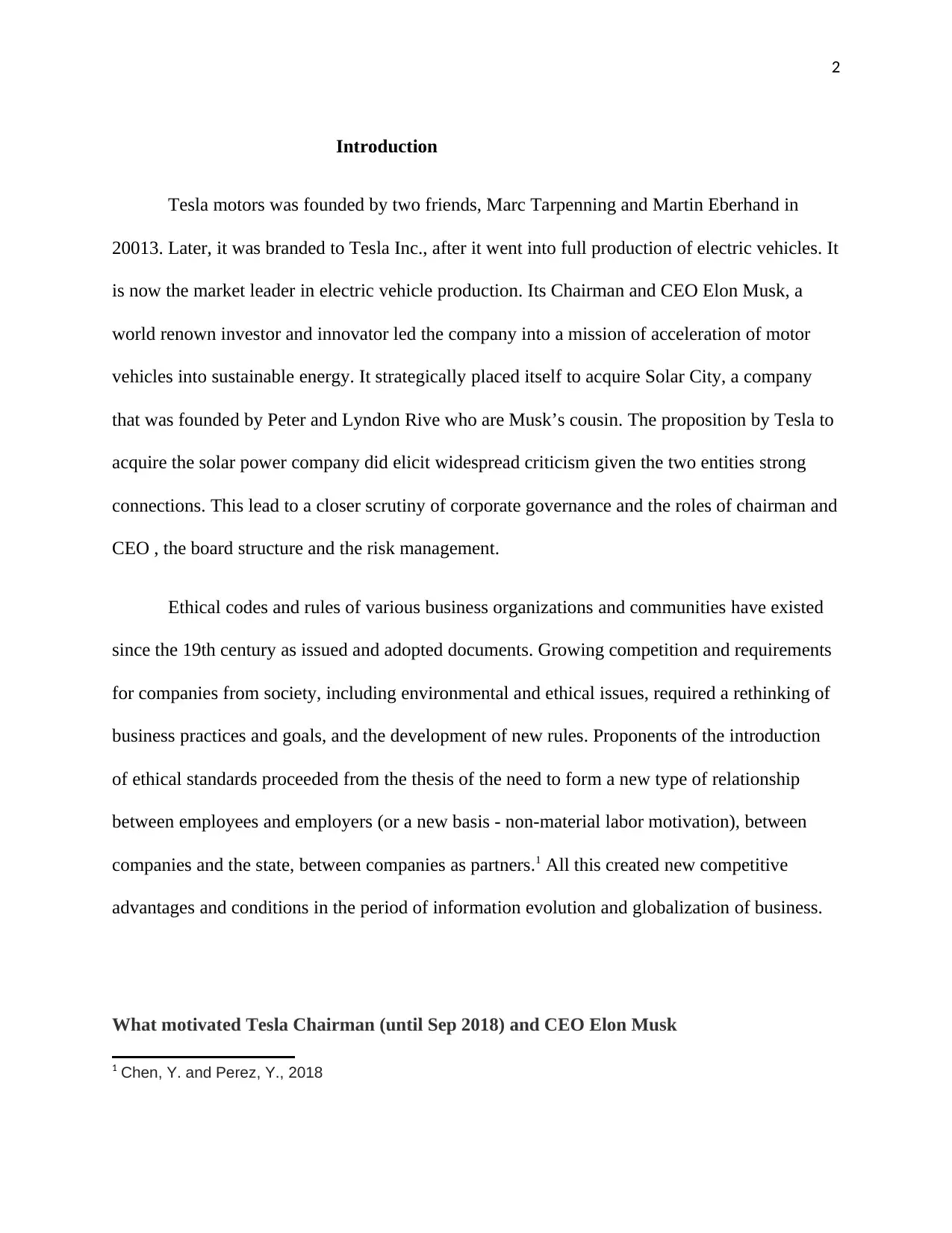
2
Introduction
Tesla motors was founded by two friends, Marc Tarpenning and Martin Eberhand in
20013. Later, it was branded to Tesla Inc., after it went into full production of electric vehicles. It
is now the market leader in electric vehicle production. Its Chairman and CEO Elon Musk, a
world renown investor and innovator led the company into a mission of acceleration of motor
vehicles into sustainable energy. It strategically placed itself to acquire Solar City, a company
that was founded by Peter and Lyndon Rive who are Musk’s cousin. The proposition by Tesla to
acquire the solar power company did elicit widespread criticism given the two entities strong
connections. This lead to a closer scrutiny of corporate governance and the roles of chairman and
CEO , the board structure and the risk management.
Ethical codes and rules of various business organizations and communities have existed
since the 19th century as issued and adopted documents. Growing competition and requirements
for companies from society, including environmental and ethical issues, required a rethinking of
business practices and goals, and the development of new rules. Proponents of the introduction
of ethical standards proceeded from the thesis of the need to form a new type of relationship
between employees and employers (or a new basis - non-material labor motivation), between
companies and the state, between companies as partners.1 All this created new competitive
advantages and conditions in the period of information evolution and globalization of business.
What motivated Tesla Chairman (until Sep 2018) and CEO Elon Musk
1 Chen, Y. and Perez, Y., 2018
Introduction
Tesla motors was founded by two friends, Marc Tarpenning and Martin Eberhand in
20013. Later, it was branded to Tesla Inc., after it went into full production of electric vehicles. It
is now the market leader in electric vehicle production. Its Chairman and CEO Elon Musk, a
world renown investor and innovator led the company into a mission of acceleration of motor
vehicles into sustainable energy. It strategically placed itself to acquire Solar City, a company
that was founded by Peter and Lyndon Rive who are Musk’s cousin. The proposition by Tesla to
acquire the solar power company did elicit widespread criticism given the two entities strong
connections. This lead to a closer scrutiny of corporate governance and the roles of chairman and
CEO , the board structure and the risk management.
Ethical codes and rules of various business organizations and communities have existed
since the 19th century as issued and adopted documents. Growing competition and requirements
for companies from society, including environmental and ethical issues, required a rethinking of
business practices and goals, and the development of new rules. Proponents of the introduction
of ethical standards proceeded from the thesis of the need to form a new type of relationship
between employees and employers (or a new basis - non-material labor motivation), between
companies and the state, between companies as partners.1 All this created new competitive
advantages and conditions in the period of information evolution and globalization of business.
What motivated Tesla Chairman (until Sep 2018) and CEO Elon Musk
1 Chen, Y. and Perez, Y., 2018
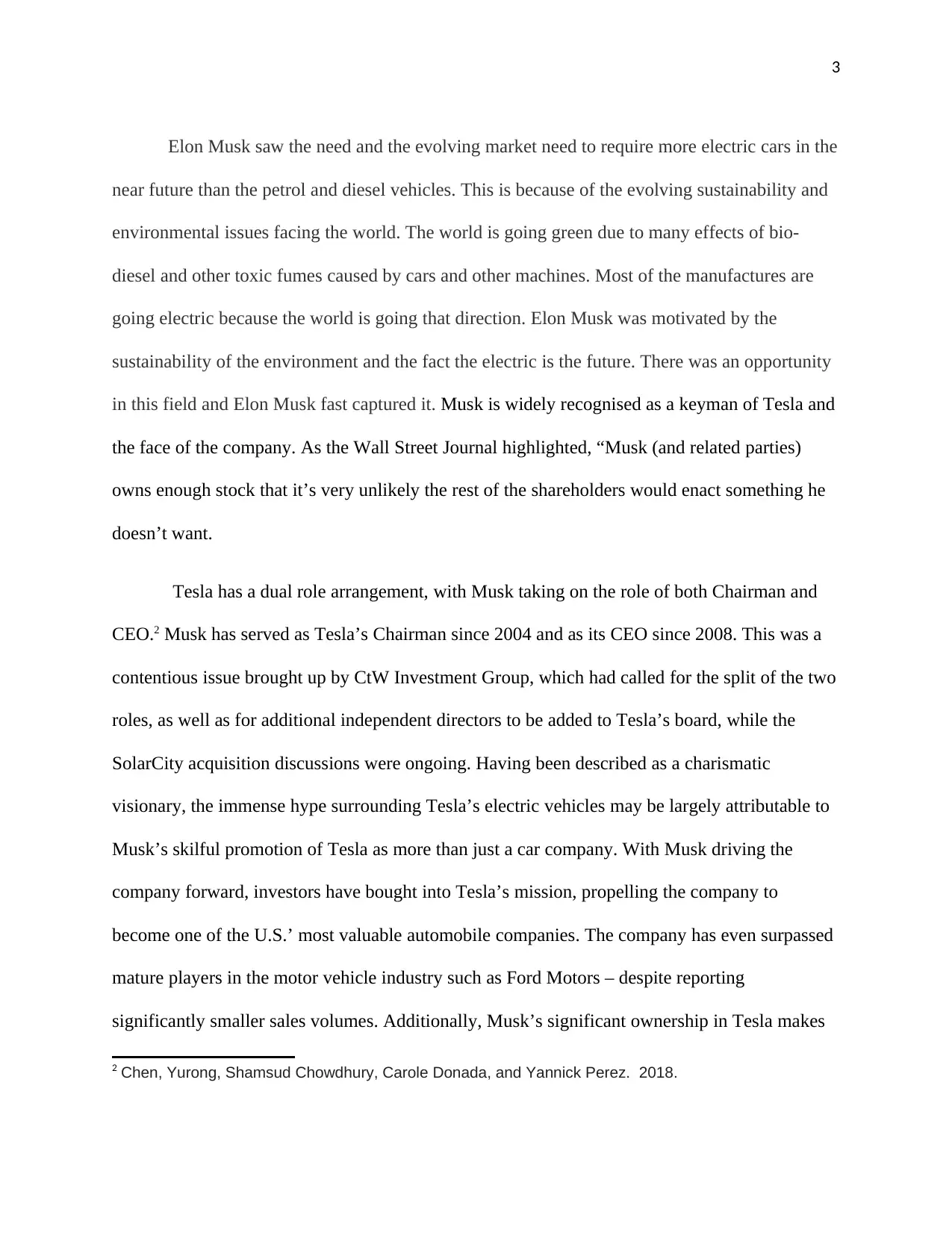
3
Elon Musk saw the need and the evolving market need to require more electric cars in the
near future than the petrol and diesel vehicles. This is because of the evolving sustainability and
environmental issues facing the world. The world is going green due to many effects of bio-
diesel and other toxic fumes caused by cars and other machines. Most of the manufactures are
going electric because the world is going that direction. Elon Musk was motivated by the
sustainability of the environment and the fact the electric is the future. There was an opportunity
in this field and Elon Musk fast captured it. Musk is widely recognised as a keyman of Tesla and
the face of the company. As the Wall Street Journal highlighted, “Musk (and related parties)
owns enough stock that it’s very unlikely the rest of the shareholders would enact something he
doesn’t want.
Tesla has a dual role arrangement, with Musk taking on the role of both Chairman and
CEO.2 Musk has served as Tesla’s Chairman since 2004 and as its CEO since 2008. This was a
contentious issue brought up by CtW Investment Group, which had called for the split of the two
roles, as well as for additional independent directors to be added to Tesla’s board, while the
SolarCity acquisition discussions were ongoing. Having been described as a charismatic
visionary, the immense hype surrounding Tesla’s electric vehicles may be largely attributable to
Musk’s skilful promotion of Tesla as more than just a car company. With Musk driving the
company forward, investors have bought into Tesla’s mission, propelling the company to
become one of the U.S.’ most valuable automobile companies. The company has even surpassed
mature players in the motor vehicle industry such as Ford Motors – despite reporting
significantly smaller sales volumes. Additionally, Musk’s significant ownership in Tesla makes
2 Chen, Yurong, Shamsud Chowdhury, Carole Donada, and Yannick Perez. 2018.
Elon Musk saw the need and the evolving market need to require more electric cars in the
near future than the petrol and diesel vehicles. This is because of the evolving sustainability and
environmental issues facing the world. The world is going green due to many effects of bio-
diesel and other toxic fumes caused by cars and other machines. Most of the manufactures are
going electric because the world is going that direction. Elon Musk was motivated by the
sustainability of the environment and the fact the electric is the future. There was an opportunity
in this field and Elon Musk fast captured it. Musk is widely recognised as a keyman of Tesla and
the face of the company. As the Wall Street Journal highlighted, “Musk (and related parties)
owns enough stock that it’s very unlikely the rest of the shareholders would enact something he
doesn’t want.
Tesla has a dual role arrangement, with Musk taking on the role of both Chairman and
CEO.2 Musk has served as Tesla’s Chairman since 2004 and as its CEO since 2008. This was a
contentious issue brought up by CtW Investment Group, which had called for the split of the two
roles, as well as for additional independent directors to be added to Tesla’s board, while the
SolarCity acquisition discussions were ongoing. Having been described as a charismatic
visionary, the immense hype surrounding Tesla’s electric vehicles may be largely attributable to
Musk’s skilful promotion of Tesla as more than just a car company. With Musk driving the
company forward, investors have bought into Tesla’s mission, propelling the company to
become one of the U.S.’ most valuable automobile companies. The company has even surpassed
mature players in the motor vehicle industry such as Ford Motors – despite reporting
significantly smaller sales volumes. Additionally, Musk’s significant ownership in Tesla makes
2 Chen, Yurong, Shamsud Chowdhury, Carole Donada, and Yannick Perez. 2018.
⊘ This is a preview!⊘
Do you want full access?
Subscribe today to unlock all pages.

Trusted by 1+ million students worldwide
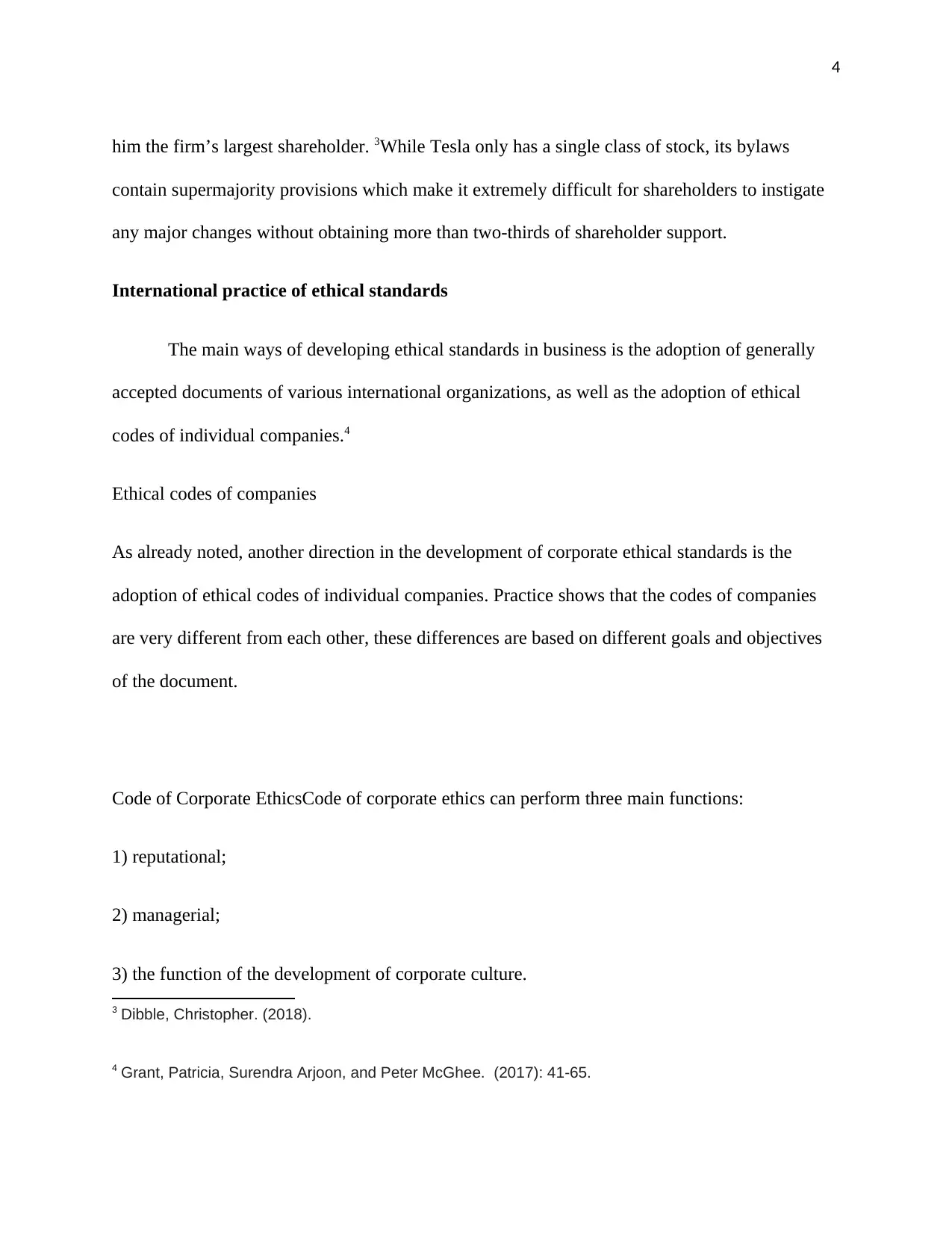
4
him the firm’s largest shareholder. 3While Tesla only has a single class of stock, its bylaws
contain supermajority provisions which make it extremely difficult for shareholders to instigate
any major changes without obtaining more than two-thirds of shareholder support.
International practice of ethical standards
The main ways of developing ethical standards in business is the adoption of generally
accepted documents of various international organizations, as well as the adoption of ethical
codes of individual companies.4
Ethical codes of companies
As already noted, another direction in the development of corporate ethical standards is the
adoption of ethical codes of individual companies. Practice shows that the codes of companies
are very different from each other, these differences are based on different goals and objectives
of the document.
Code of Corporate EthicsCode of corporate ethics can perform three main functions:
1) reputational;
2) managerial;
3) the function of the development of corporate culture.
3 Dibble, Christopher. (2018).
4 Grant, Patricia, Surendra Arjoon, and Peter McGhee. (2017): 41-65.
him the firm’s largest shareholder. 3While Tesla only has a single class of stock, its bylaws
contain supermajority provisions which make it extremely difficult for shareholders to instigate
any major changes without obtaining more than two-thirds of shareholder support.
International practice of ethical standards
The main ways of developing ethical standards in business is the adoption of generally
accepted documents of various international organizations, as well as the adoption of ethical
codes of individual companies.4
Ethical codes of companies
As already noted, another direction in the development of corporate ethical standards is the
adoption of ethical codes of individual companies. Practice shows that the codes of companies
are very different from each other, these differences are based on different goals and objectives
of the document.
Code of Corporate EthicsCode of corporate ethics can perform three main functions:
1) reputational;
2) managerial;
3) the function of the development of corporate culture.
3 Dibble, Christopher. (2018).
4 Grant, Patricia, Surendra Arjoon, and Peter McGhee. (2017): 41-65.
Paraphrase This Document
Need a fresh take? Get an instant paraphrase of this document with our AI Paraphraser
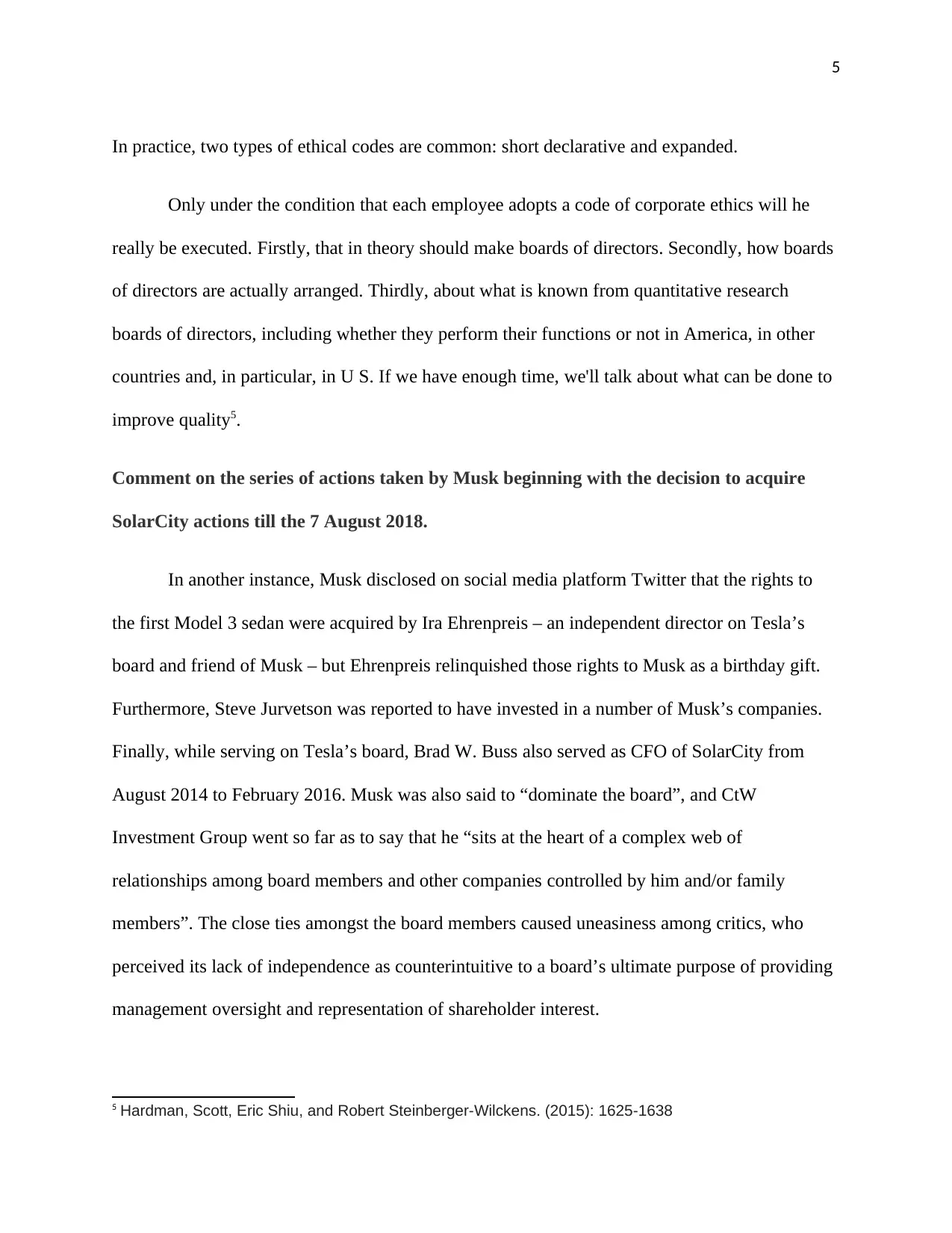
5
In practice, two types of ethical codes are common: short declarative and expanded.
Only under the condition that each employee adopts a code of corporate ethics will he
really be executed. Firstly, that in theory should make boards of directors. Secondly, how boards
of directors are actually arranged. Thirdly, about what is known from quantitative research
boards of directors, including whether they perform their functions or not in America, in other
countries and, in particular, in U S. If we have enough time, we'll talk about what can be done to
improve quality5.
Comment on the series of actions taken by Musk beginning with the decision to acquire
SolarCity actions till the 7 August 2018.
In another instance, Musk disclosed on social media platform Twitter that the rights to
the first Model 3 sedan were acquired by Ira Ehrenpreis – an independent director on Tesla’s
board and friend of Musk – but Ehrenpreis relinquished those rights to Musk as a birthday gift.
Furthermore, Steve Jurvetson was reported to have invested in a number of Musk’s companies.
Finally, while serving on Tesla’s board, Brad W. Buss also served as CFO of SolarCity from
August 2014 to February 2016. Musk was also said to “dominate the board”, and CtW
Investment Group went so far as to say that he “sits at the heart of a complex web of
relationships among board members and other companies controlled by him and/or family
members”. The close ties amongst the board members caused uneasiness among critics, who
perceived its lack of independence as counterintuitive to a board’s ultimate purpose of providing
management oversight and representation of shareholder interest.
5 Hardman, Scott, Eric Shiu, and Robert Steinberger-Wilckens. (2015): 1625-1638
In practice, two types of ethical codes are common: short declarative and expanded.
Only under the condition that each employee adopts a code of corporate ethics will he
really be executed. Firstly, that in theory should make boards of directors. Secondly, how boards
of directors are actually arranged. Thirdly, about what is known from quantitative research
boards of directors, including whether they perform their functions or not in America, in other
countries and, in particular, in U S. If we have enough time, we'll talk about what can be done to
improve quality5.
Comment on the series of actions taken by Musk beginning with the decision to acquire
SolarCity actions till the 7 August 2018.
In another instance, Musk disclosed on social media platform Twitter that the rights to
the first Model 3 sedan were acquired by Ira Ehrenpreis – an independent director on Tesla’s
board and friend of Musk – but Ehrenpreis relinquished those rights to Musk as a birthday gift.
Furthermore, Steve Jurvetson was reported to have invested in a number of Musk’s companies.
Finally, while serving on Tesla’s board, Brad W. Buss also served as CFO of SolarCity from
August 2014 to February 2016. Musk was also said to “dominate the board”, and CtW
Investment Group went so far as to say that he “sits at the heart of a complex web of
relationships among board members and other companies controlled by him and/or family
members”. The close ties amongst the board members caused uneasiness among critics, who
perceived its lack of independence as counterintuitive to a board’s ultimate purpose of providing
management oversight and representation of shareholder interest.
5 Hardman, Scott, Eric Shiu, and Robert Steinberger-Wilckens. (2015): 1625-1638
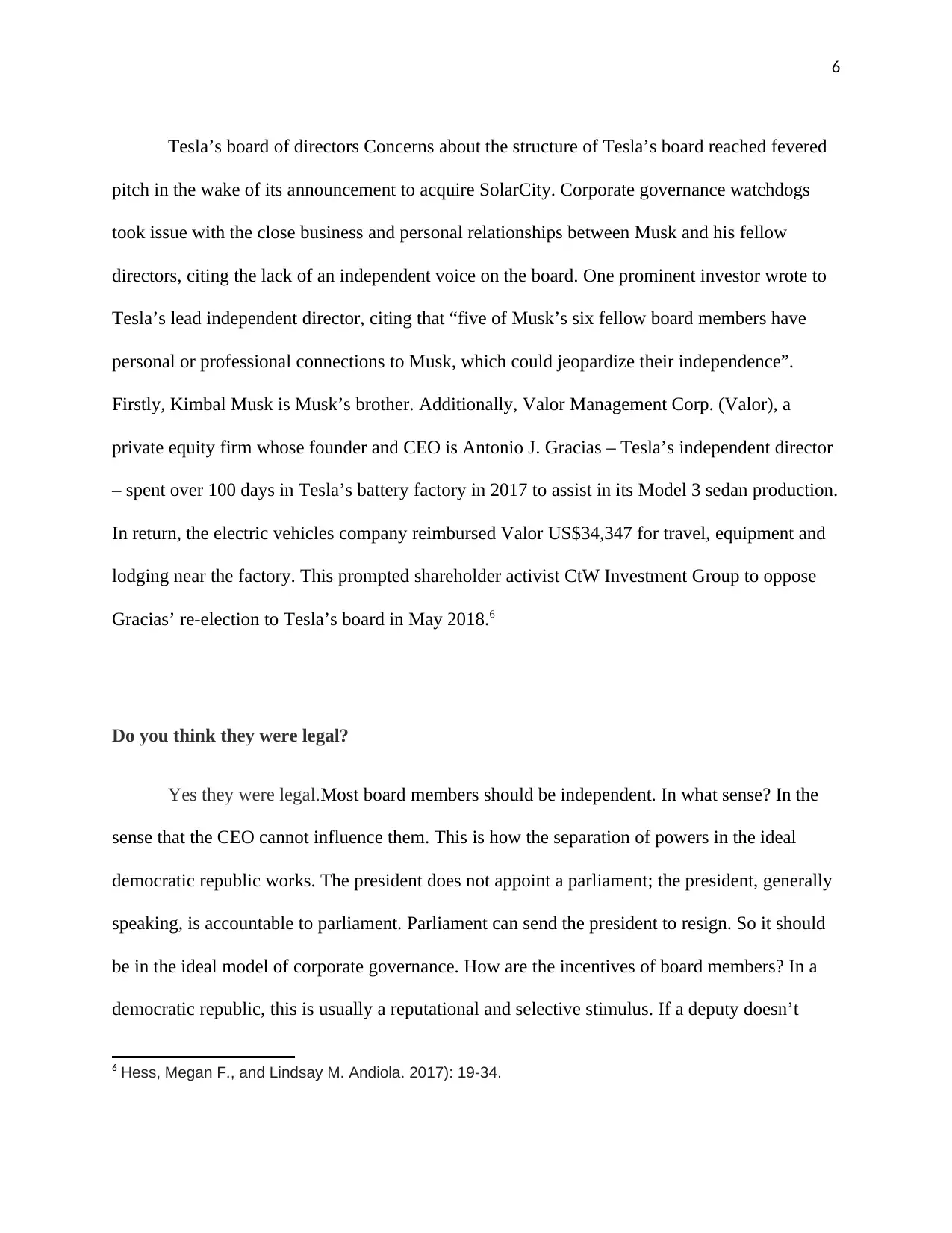
6
Tesla’s board of directors Concerns about the structure of Tesla’s board reached fevered
pitch in the wake of its announcement to acquire SolarCity. Corporate governance watchdogs
took issue with the close business and personal relationships between Musk and his fellow
directors, citing the lack of an independent voice on the board. One prominent investor wrote to
Tesla’s lead independent director, citing that “five of Musk’s six fellow board members have
personal or professional connections to Musk, which could jeopardize their independence”.
Firstly, Kimbal Musk is Musk’s brother. Additionally, Valor Management Corp. (Valor), a
private equity firm whose founder and CEO is Antonio J. Gracias – Tesla’s independent director
– spent over 100 days in Tesla’s battery factory in 2017 to assist in its Model 3 sedan production.
In return, the electric vehicles company reimbursed Valor US$34,347 for travel, equipment and
lodging near the factory. This prompted shareholder activist CtW Investment Group to oppose
Gracias’ re-election to Tesla’s board in May 2018.6
Do you think they were legal?
Yes they were legal.Most board members should be independent. In what sense? In the
sense that the CEO cannot influence them. This is how the separation of powers in the ideal
democratic republic works. The president does not appoint a parliament; the president, generally
speaking, is accountable to parliament. Parliament can send the president to resign. So it should
be in the ideal model of corporate governance. How are the incentives of board members? In a
democratic republic, this is usually a reputational and selective stimulus. If a deputy doesn’t
6 Hess, Megan F., and Lindsay M. Andiola. 2017): 19-34.
Tesla’s board of directors Concerns about the structure of Tesla’s board reached fevered
pitch in the wake of its announcement to acquire SolarCity. Corporate governance watchdogs
took issue with the close business and personal relationships between Musk and his fellow
directors, citing the lack of an independent voice on the board. One prominent investor wrote to
Tesla’s lead independent director, citing that “five of Musk’s six fellow board members have
personal or professional connections to Musk, which could jeopardize their independence”.
Firstly, Kimbal Musk is Musk’s brother. Additionally, Valor Management Corp. (Valor), a
private equity firm whose founder and CEO is Antonio J. Gracias – Tesla’s independent director
– spent over 100 days in Tesla’s battery factory in 2017 to assist in its Model 3 sedan production.
In return, the electric vehicles company reimbursed Valor US$34,347 for travel, equipment and
lodging near the factory. This prompted shareholder activist CtW Investment Group to oppose
Gracias’ re-election to Tesla’s board in May 2018.6
Do you think they were legal?
Yes they were legal.Most board members should be independent. In what sense? In the
sense that the CEO cannot influence them. This is how the separation of powers in the ideal
democratic republic works. The president does not appoint a parliament; the president, generally
speaking, is accountable to parliament. Parliament can send the president to resign. So it should
be in the ideal model of corporate governance. How are the incentives of board members? In a
democratic republic, this is usually a reputational and selective stimulus. If a deputy doesn’t
6 Hess, Megan F., and Lindsay M. Andiola. 2017): 19-34.
⊘ This is a preview!⊘
Do you want full access?
Subscribe today to unlock all pages.

Trusted by 1+ million students worldwide
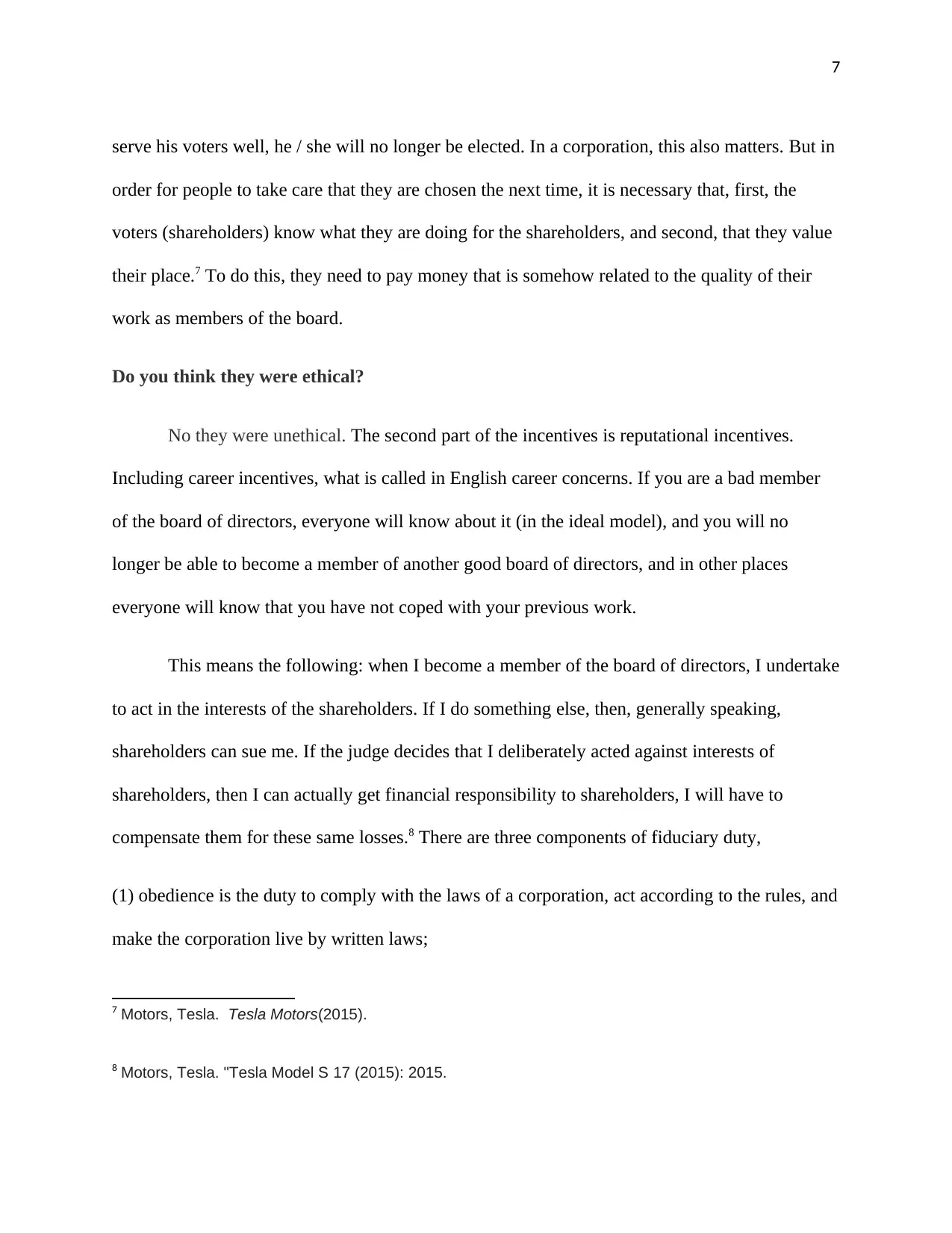
7
serve his voters well, he / she will no longer be elected. In a corporation, this also matters. But in
order for people to take care that they are chosen the next time, it is necessary that, first, the
voters (shareholders) know what they are doing for the shareholders, and second, that they value
their place.7 To do this, they need to pay money that is somehow related to the quality of their
work as members of the board.
Do you think they were ethical?
No they were unethical. The second part of the incentives is reputational incentives.
Including career incentives, what is called in English career concerns. If you are a bad member
of the board of directors, everyone will know about it (in the ideal model), and you will no
longer be able to become a member of another good board of directors, and in other places
everyone will know that you have not coped with your previous work.
This means the following: when I become a member of the board of directors, I undertake
to act in the interests of the shareholders. If I do something else, then, generally speaking,
shareholders can sue me. If the judge decides that I deliberately acted against interests of
shareholders, then I can actually get financial responsibility to shareholders, I will have to
compensate them for these same losses.8 There are three components of fiduciary duty,
(1) obedience is the duty to comply with the laws of a corporation, act according to the rules, and
make the corporation live by written laws;
7 Motors, Tesla. Tesla Motors(2015).
8 Motors, Tesla. "Tesla Model S 17 (2015): 2015.
serve his voters well, he / she will no longer be elected. In a corporation, this also matters. But in
order for people to take care that they are chosen the next time, it is necessary that, first, the
voters (shareholders) know what they are doing for the shareholders, and second, that they value
their place.7 To do this, they need to pay money that is somehow related to the quality of their
work as members of the board.
Do you think they were ethical?
No they were unethical. The second part of the incentives is reputational incentives.
Including career incentives, what is called in English career concerns. If you are a bad member
of the board of directors, everyone will know about it (in the ideal model), and you will no
longer be able to become a member of another good board of directors, and in other places
everyone will know that you have not coped with your previous work.
This means the following: when I become a member of the board of directors, I undertake
to act in the interests of the shareholders. If I do something else, then, generally speaking,
shareholders can sue me. If the judge decides that I deliberately acted against interests of
shareholders, then I can actually get financial responsibility to shareholders, I will have to
compensate them for these same losses.8 There are three components of fiduciary duty,
(1) obedience is the duty to comply with the laws of a corporation, act according to the rules, and
make the corporation live by written laws;
7 Motors, Tesla. Tesla Motors(2015).
8 Motors, Tesla. "Tesla Model S 17 (2015): 2015.
Paraphrase This Document
Need a fresh take? Get an instant paraphrase of this document with our AI Paraphraser
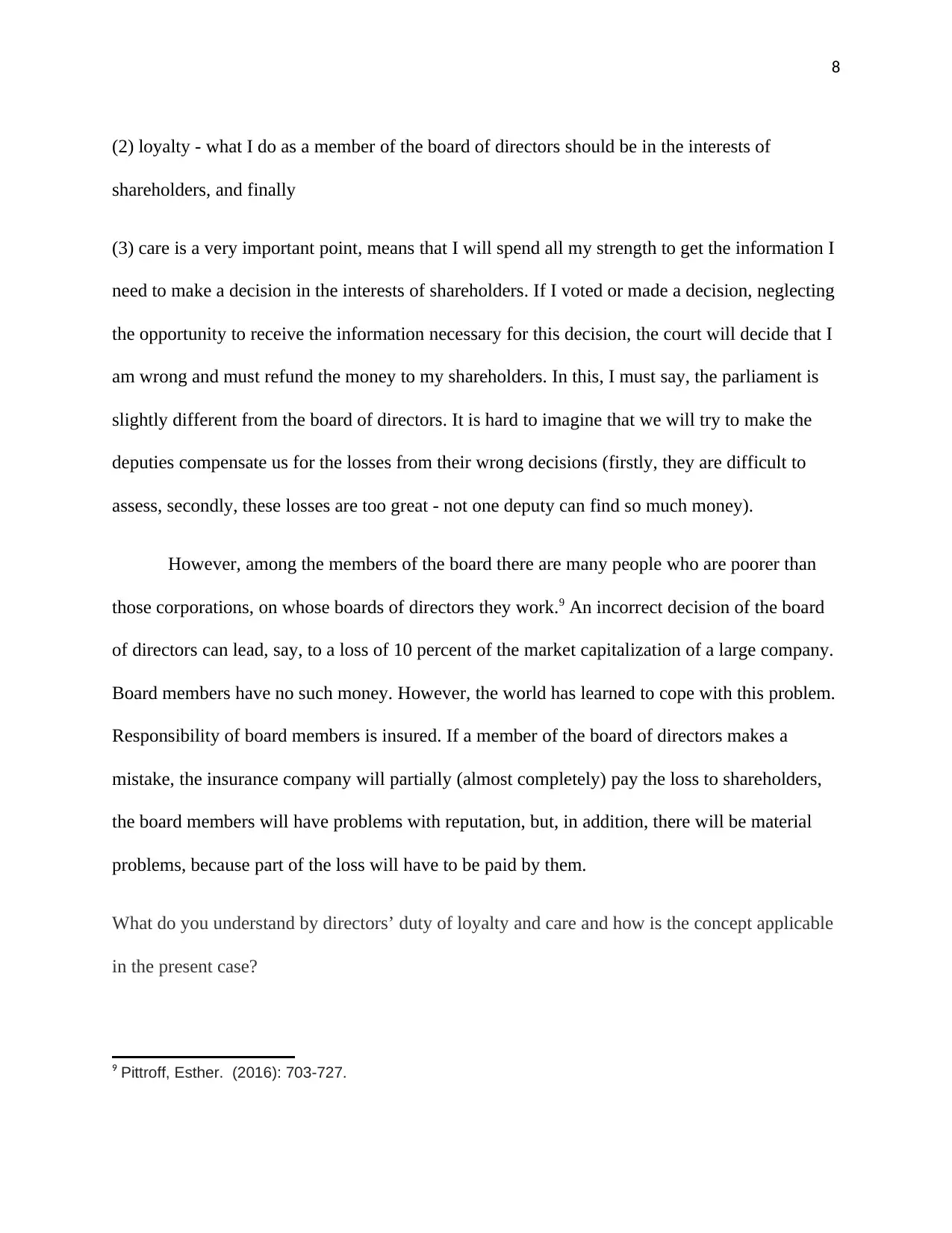
8
(2) loyalty - what I do as a member of the board of directors should be in the interests of
shareholders, and finally
(3) care is a very important point, means that I will spend all my strength to get the information I
need to make a decision in the interests of shareholders. If I voted or made a decision, neglecting
the opportunity to receive the information necessary for this decision, the court will decide that I
am wrong and must refund the money to my shareholders. In this, I must say, the parliament is
slightly different from the board of directors. It is hard to imagine that we will try to make the
deputies compensate us for the losses from their wrong decisions (firstly, they are difficult to
assess, secondly, these losses are too great - not one deputy can find so much money).
However, among the members of the board there are many people who are poorer than
those corporations, on whose boards of directors they work.9 An incorrect decision of the board
of directors can lead, say, to a loss of 10 percent of the market capitalization of a large company.
Board members have no such money. However, the world has learned to cope with this problem.
Responsibility of board members is insured. If a member of the board of directors makes a
mistake, the insurance company will partially (almost completely) pay the loss to shareholders,
the board members will have problems with reputation, but, in addition, there will be material
problems, because part of the loss will have to be paid by them.
What do you understand by directors’ duty of loyalty and care and how is the concept applicable
in the present case?
9 Pittroff, Esther. (2016): 703-727.
(2) loyalty - what I do as a member of the board of directors should be in the interests of
shareholders, and finally
(3) care is a very important point, means that I will spend all my strength to get the information I
need to make a decision in the interests of shareholders. If I voted or made a decision, neglecting
the opportunity to receive the information necessary for this decision, the court will decide that I
am wrong and must refund the money to my shareholders. In this, I must say, the parliament is
slightly different from the board of directors. It is hard to imagine that we will try to make the
deputies compensate us for the losses from their wrong decisions (firstly, they are difficult to
assess, secondly, these losses are too great - not one deputy can find so much money).
However, among the members of the board there are many people who are poorer than
those corporations, on whose boards of directors they work.9 An incorrect decision of the board
of directors can lead, say, to a loss of 10 percent of the market capitalization of a large company.
Board members have no such money. However, the world has learned to cope with this problem.
Responsibility of board members is insured. If a member of the board of directors makes a
mistake, the insurance company will partially (almost completely) pay the loss to shareholders,
the board members will have problems with reputation, but, in addition, there will be material
problems, because part of the loss will have to be paid by them.
What do you understand by directors’ duty of loyalty and care and how is the concept applicable
in the present case?
9 Pittroff, Esther. (2016): 703-727.
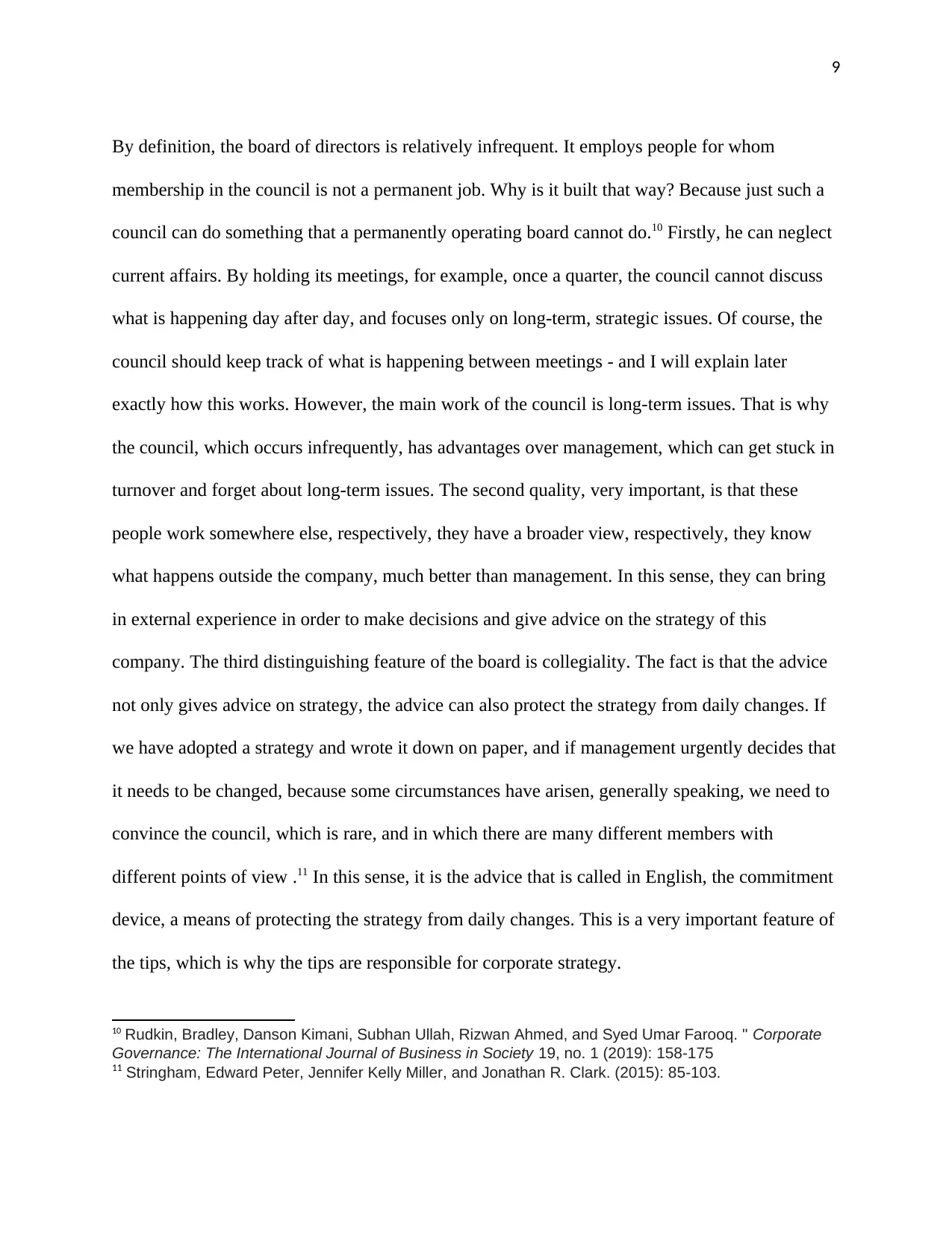
9
By definition, the board of directors is relatively infrequent. It employs people for whom
membership in the council is not a permanent job. Why is it built that way? Because just such a
council can do something that a permanently operating board cannot do.10 Firstly, he can neglect
current affairs. By holding its meetings, for example, once a quarter, the council cannot discuss
what is happening day after day, and focuses only on long-term, strategic issues. Of course, the
council should keep track of what is happening between meetings - and I will explain later
exactly how this works. However, the main work of the council is long-term issues. That is why
the council, which occurs infrequently, has advantages over management, which can get stuck in
turnover and forget about long-term issues. The second quality, very important, is that these
people work somewhere else, respectively, they have a broader view, respectively, they know
what happens outside the company, much better than management. In this sense, they can bring
in external experience in order to make decisions and give advice on the strategy of this
company. The third distinguishing feature of the board is collegiality. The fact is that the advice
not only gives advice on strategy, the advice can also protect the strategy from daily changes. If
we have adopted a strategy and wrote it down on paper, and if management urgently decides that
it needs to be changed, because some circumstances have arisen, generally speaking, we need to
convince the council, which is rare, and in which there are many different members with
different points of view .11 In this sense, it is the advice that is called in English, the commitment
device, a means of protecting the strategy from daily changes. This is a very important feature of
the tips, which is why the tips are responsible for corporate strategy.
10 Rudkin, Bradley, Danson Kimani, Subhan Ullah, Rizwan Ahmed, and Syed Umar Farooq. " Corporate
Governance: The International Journal of Business in Society 19, no. 1 (2019): 158-175
11 Stringham, Edward Peter, Jennifer Kelly Miller, and Jonathan R. Clark. (2015): 85-103.
By definition, the board of directors is relatively infrequent. It employs people for whom
membership in the council is not a permanent job. Why is it built that way? Because just such a
council can do something that a permanently operating board cannot do.10 Firstly, he can neglect
current affairs. By holding its meetings, for example, once a quarter, the council cannot discuss
what is happening day after day, and focuses only on long-term, strategic issues. Of course, the
council should keep track of what is happening between meetings - and I will explain later
exactly how this works. However, the main work of the council is long-term issues. That is why
the council, which occurs infrequently, has advantages over management, which can get stuck in
turnover and forget about long-term issues. The second quality, very important, is that these
people work somewhere else, respectively, they have a broader view, respectively, they know
what happens outside the company, much better than management. In this sense, they can bring
in external experience in order to make decisions and give advice on the strategy of this
company. The third distinguishing feature of the board is collegiality. The fact is that the advice
not only gives advice on strategy, the advice can also protect the strategy from daily changes. If
we have adopted a strategy and wrote it down on paper, and if management urgently decides that
it needs to be changed, because some circumstances have arisen, generally speaking, we need to
convince the council, which is rare, and in which there are many different members with
different points of view .11 In this sense, it is the advice that is called in English, the commitment
device, a means of protecting the strategy from daily changes. This is a very important feature of
the tips, which is why the tips are responsible for corporate strategy.
10 Rudkin, Bradley, Danson Kimani, Subhan Ullah, Rizwan Ahmed, and Syed Umar Farooq. " Corporate
Governance: The International Journal of Business in Society 19, no. 1 (2019): 158-175
11 Stringham, Edward Peter, Jennifer Kelly Miller, and Jonathan R. Clark. (2015): 85-103.
⊘ This is a preview!⊘
Do you want full access?
Subscribe today to unlock all pages.

Trusted by 1+ million students worldwide
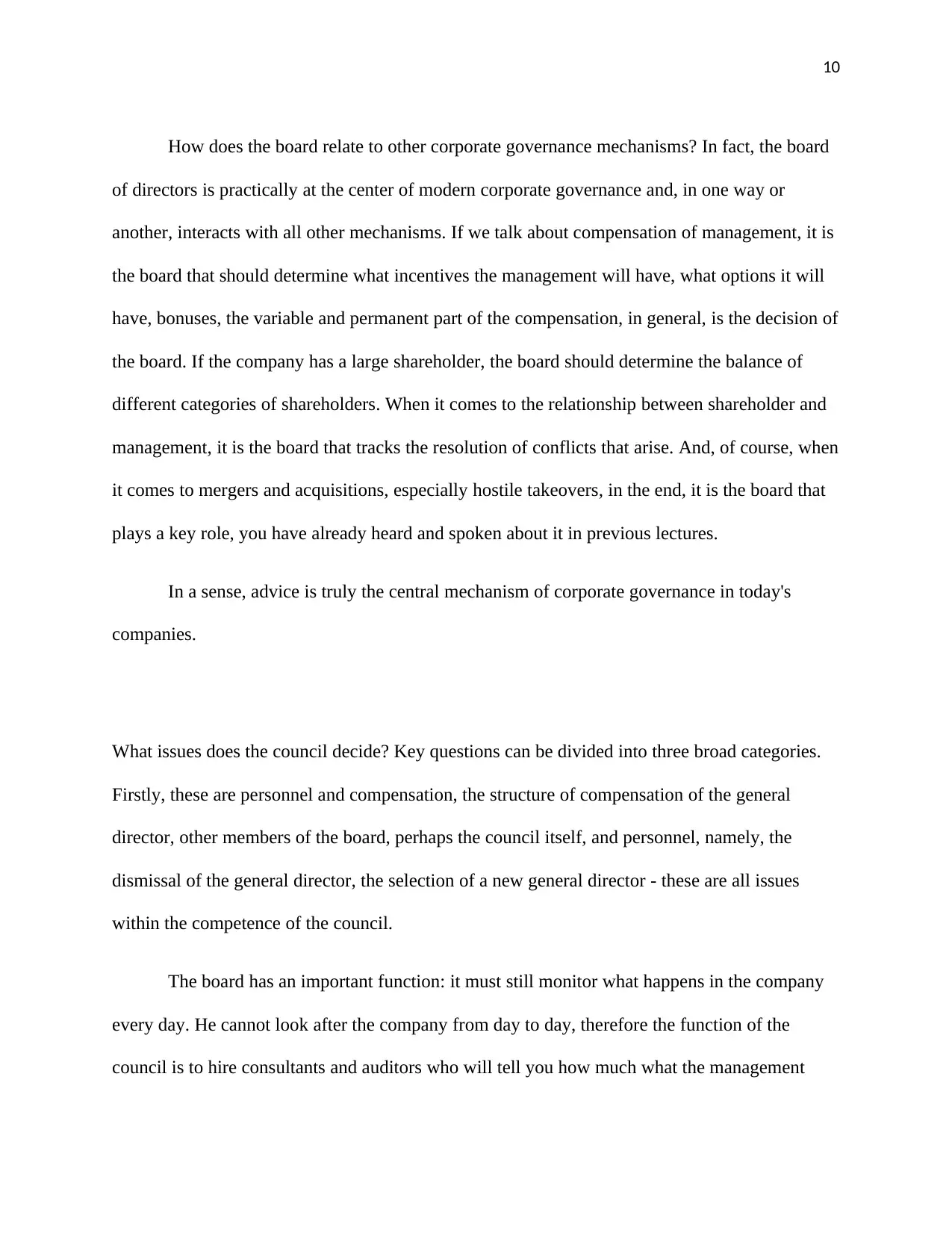
10
How does the board relate to other corporate governance mechanisms? In fact, the board
of directors is practically at the center of modern corporate governance and, in one way or
another, interacts with all other mechanisms. If we talk about compensation of management, it is
the board that should determine what incentives the management will have, what options it will
have, bonuses, the variable and permanent part of the compensation, in general, is the decision of
the board. If the company has a large shareholder, the board should determine the balance of
different categories of shareholders. When it comes to the relationship between shareholder and
management, it is the board that tracks the resolution of conflicts that arise. And, of course, when
it comes to mergers and acquisitions, especially hostile takeovers, in the end, it is the board that
plays a key role, you have already heard and spoken about it in previous lectures.
In a sense, advice is truly the central mechanism of corporate governance in today's
companies.
What issues does the council decide? Key questions can be divided into three broad categories.
Firstly, these are personnel and compensation, the structure of compensation of the general
director, other members of the board, perhaps the council itself, and personnel, namely, the
dismissal of the general director, the selection of a new general director - these are all issues
within the competence of the council.
The board has an important function: it must still monitor what happens in the company
every day. He cannot look after the company from day to day, therefore the function of the
council is to hire consultants and auditors who will tell you how much what the management
How does the board relate to other corporate governance mechanisms? In fact, the board
of directors is practically at the center of modern corporate governance and, in one way or
another, interacts with all other mechanisms. If we talk about compensation of management, it is
the board that should determine what incentives the management will have, what options it will
have, bonuses, the variable and permanent part of the compensation, in general, is the decision of
the board. If the company has a large shareholder, the board should determine the balance of
different categories of shareholders. When it comes to the relationship between shareholder and
management, it is the board that tracks the resolution of conflicts that arise. And, of course, when
it comes to mergers and acquisitions, especially hostile takeovers, in the end, it is the board that
plays a key role, you have already heard and spoken about it in previous lectures.
In a sense, advice is truly the central mechanism of corporate governance in today's
companies.
What issues does the council decide? Key questions can be divided into three broad categories.
Firstly, these are personnel and compensation, the structure of compensation of the general
director, other members of the board, perhaps the council itself, and personnel, namely, the
dismissal of the general director, the selection of a new general director - these are all issues
within the competence of the council.
The board has an important function: it must still monitor what happens in the company
every day. He cannot look after the company from day to day, therefore the function of the
council is to hire consultants and auditors who will tell you how much what the management
Paraphrase This Document
Need a fresh take? Get an instant paraphrase of this document with our AI Paraphraser
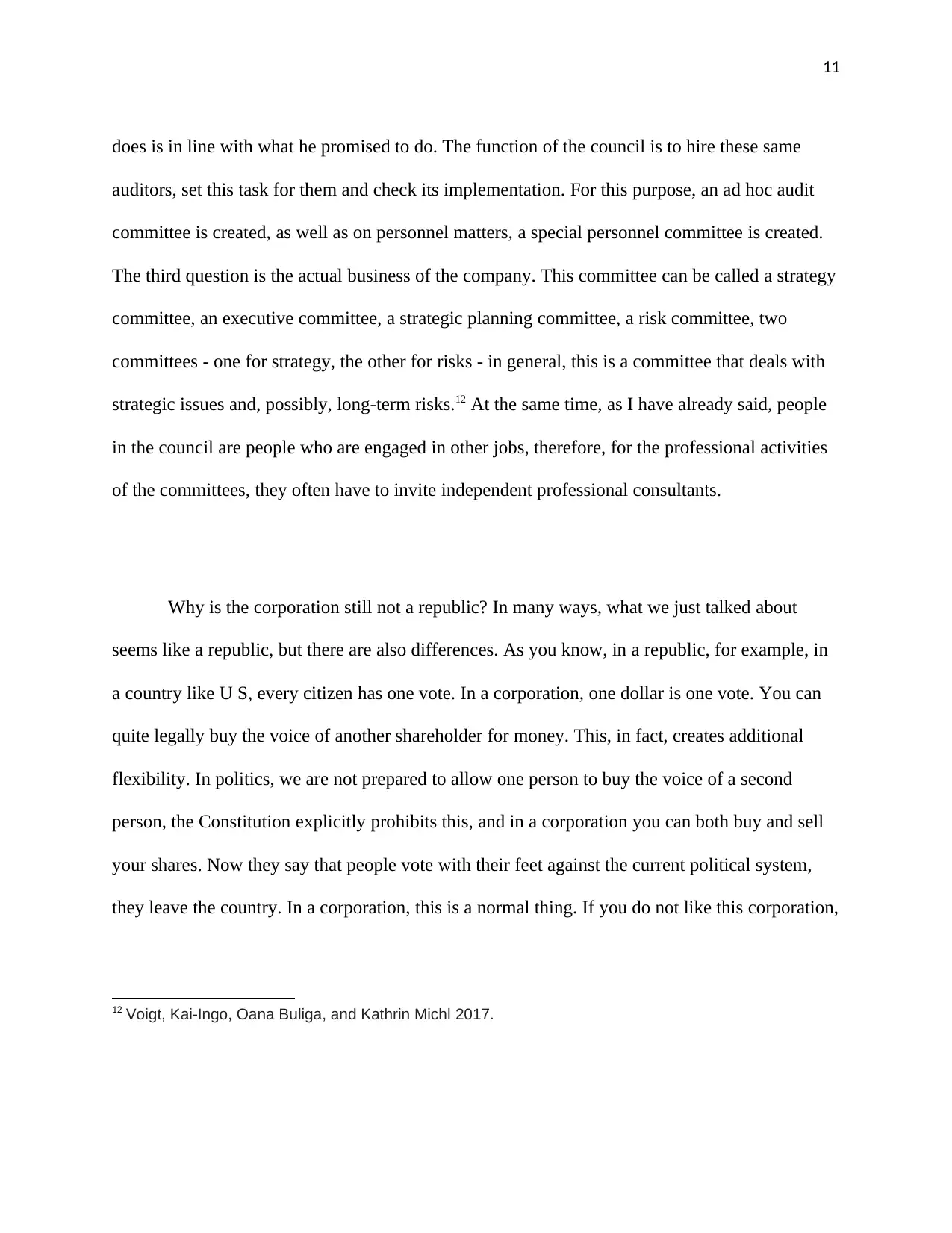
11
does is in line with what he promised to do. The function of the council is to hire these same
auditors, set this task for them and check its implementation. For this purpose, an ad hoc audit
committee is created, as well as on personnel matters, a special personnel committee is created.
The third question is the actual business of the company. This committee can be called a strategy
committee, an executive committee, a strategic planning committee, a risk committee, two
committees - one for strategy, the other for risks - in general, this is a committee that deals with
strategic issues and, possibly, long-term risks.12 At the same time, as I have already said, people
in the council are people who are engaged in other jobs, therefore, for the professional activities
of the committees, they often have to invite independent professional consultants.
Why is the corporation still not a republic? In many ways, what we just talked about
seems like a republic, but there are also differences. As you know, in a republic, for example, in
a country like U S, every citizen has one vote. In a corporation, one dollar is one vote. You can
quite legally buy the voice of another shareholder for money. This, in fact, creates additional
flexibility. In politics, we are not prepared to allow one person to buy the voice of a second
person, the Constitution explicitly prohibits this, and in a corporation you can both buy and sell
your shares. Now they say that people vote with their feet against the current political system,
they leave the country. In a corporation, this is a normal thing. If you do not like this corporation,
12 Voigt, Kai-Ingo, Oana Buliga, and Kathrin Michl 2017.
does is in line with what he promised to do. The function of the council is to hire these same
auditors, set this task for them and check its implementation. For this purpose, an ad hoc audit
committee is created, as well as on personnel matters, a special personnel committee is created.
The third question is the actual business of the company. This committee can be called a strategy
committee, an executive committee, a strategic planning committee, a risk committee, two
committees - one for strategy, the other for risks - in general, this is a committee that deals with
strategic issues and, possibly, long-term risks.12 At the same time, as I have already said, people
in the council are people who are engaged in other jobs, therefore, for the professional activities
of the committees, they often have to invite independent professional consultants.
Why is the corporation still not a republic? In many ways, what we just talked about
seems like a republic, but there are also differences. As you know, in a republic, for example, in
a country like U S, every citizen has one vote. In a corporation, one dollar is one vote. You can
quite legally buy the voice of another shareholder for money. This, in fact, creates additional
flexibility. In politics, we are not prepared to allow one person to buy the voice of a second
person, the Constitution explicitly prohibits this, and in a corporation you can both buy and sell
your shares. Now they say that people vote with their feet against the current political system,
they leave the country. In a corporation, this is a normal thing. If you do not like this corporation,
12 Voigt, Kai-Ingo, Oana Buliga, and Kathrin Michl 2017.
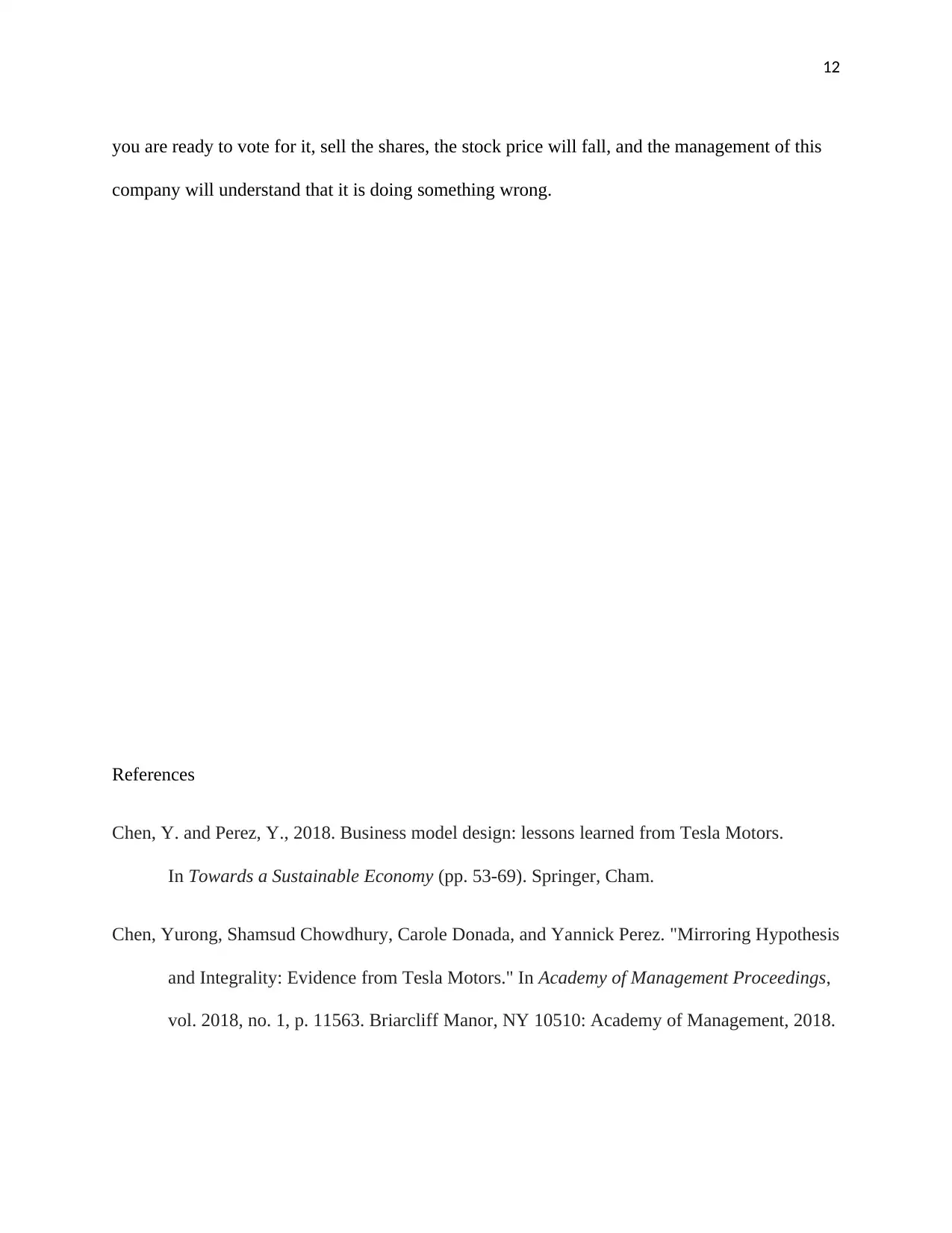
12
you are ready to vote for it, sell the shares, the stock price will fall, and the management of this
company will understand that it is doing something wrong.
References
Chen, Y. and Perez, Y., 2018. Business model design: lessons learned from Tesla Motors.
In Towards a Sustainable Economy (pp. 53-69). Springer, Cham.
Chen, Yurong, Shamsud Chowdhury, Carole Donada, and Yannick Perez. "Mirroring Hypothesis
and Integrality: Evidence from Tesla Motors." In Academy of Management Proceedings,
vol. 2018, no. 1, p. 11563. Briarcliff Manor, NY 10510: Academy of Management, 2018.
you are ready to vote for it, sell the shares, the stock price will fall, and the management of this
company will understand that it is doing something wrong.
References
Chen, Y. and Perez, Y., 2018. Business model design: lessons learned from Tesla Motors.
In Towards a Sustainable Economy (pp. 53-69). Springer, Cham.
Chen, Yurong, Shamsud Chowdhury, Carole Donada, and Yannick Perez. "Mirroring Hypothesis
and Integrality: Evidence from Tesla Motors." In Academy of Management Proceedings,
vol. 2018, no. 1, p. 11563. Briarcliff Manor, NY 10510: Academy of Management, 2018.
⊘ This is a preview!⊘
Do you want full access?
Subscribe today to unlock all pages.

Trusted by 1+ million students worldwide
1 out of 14
Related Documents
Your All-in-One AI-Powered Toolkit for Academic Success.
+13062052269
info@desklib.com
Available 24*7 on WhatsApp / Email
![[object Object]](/_next/static/media/star-bottom.7253800d.svg)
Unlock your academic potential
Copyright © 2020–2025 A2Z Services. All Rights Reserved. Developed and managed by ZUCOL.





